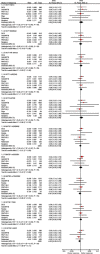Variants in Pharmacokinetic Transporters and Glycemic Response to Metformin: A Metgen Meta-Analysis
- PMID: 27859023
- PMCID: PMC5425333
- DOI: 10.1002/cpt.567
Variants in Pharmacokinetic Transporters and Glycemic Response to Metformin: A Metgen Meta-Analysis
Abstract
Therapeutic response to metformin, a first-line drug for type 2 diabetes (T2D), is highly variable, in part likely due to genetic factors. To date, metformin pharmacogenetic studies have mainly focused on the impact of variants in metformin transporter genes, with inconsistent results. To clarify the significance of these variants in glycemic response to metformin in T2D, we performed a large-scale meta-analysis across the cohorts of the Metformin Genetics Consortium (MetGen). Nine candidate polymorphisms in five transporter genes (organic cation transporter [OCT]1, OCT2, multidrug and toxin extrusion transporter [MATE]1, MATE2-K, and OCTN1) were analyzed in up to 7,968 individuals. None of the variants showed a significant effect on metformin response in the primary analysis, or in the exploratory secondary analyses, when patients were stratified according to possible confounding genotypes or prescribed a daily dose of metformin. Our results suggest that candidate transporter gene variants have little contribution to variability in glycemic response to metformin in T2D.
© 2017 The Authors Clinical Pharmacology & Therapeutics published by Wiley Periodicals, Inc. on behalf of American Society for Clinical Pharmacology and Therapeutics.
Figures

References
-
- Hermann, L.S. , Scherstén, B. , Bitzén, P.O. , Kjellström, T. , Lindgärde, F. & Melander, A. Therapeutic comparison of metformin and sulfonylurea, alone and in various combinations. A double‐blind controlled study. Diabetes Care 17, 1100–1109 (1994). - PubMed
-
- Kahn, S.E. et al Glycemic durability of rosiglitazone, metformin, or glyburide monotherapy. N. Engl. J. Med. 355, 2427–2443 (2006). - PubMed
-
- Giacomini, K.M. et al International Transporter Consortium commentary on clinically important transporter polymorphisms. Clin. Pharmacol. Ther. 94, 23–26 (2013). - PubMed
-
- Foretz, M. , Guigas, B. , Bertrand, L. , Pollak, M. & Viollet, B. Metformin: from mechanisms of action to therapies. Cell. Metab. 20, 953–966 (2014). - PubMed
Publication types
MeSH terms
Substances
Grants and funding
LinkOut - more resources
Full Text Sources
Other Literature Sources
Medical
Molecular Biology Databases

